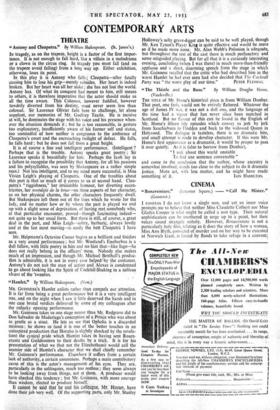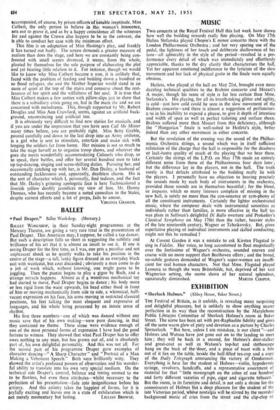CINEMA
Bonavent u re." (Leicester Square.) - Call Me Mister." (Gaumont.) I CONFESS I do not know a single nun, and yet an inner voice prompts me to believe that neither Miss Claudette Colbert nor Miss Gladys Cooper is what might be called a mm type. Their natural sophistication can be smothered in serge up to a point, but their voices sound strangely unholy. However, Bonaventure is not a particularly holy film, relating as it does the story of how a woman, Miss Ann Blyth, convicted of murder and on her way to be executed at Norwich Gaol, is forced by floods to take refuge in a convent;
accompanied, of course, by prison officers of iidtable ineptitude. Miss Colbert, the only person to believe in this woman's innocence, sets out to prove it, and as by a happy coincidence all the witnesses for and against the Crown also happen to be in the convent, she Is able to conduct her case with the minimum effort.
This film is an adaptation of Miss Hastings's play, and frankly It has turned out badly. The screen demands a greater measure of realism than does the stage, and here we are constantly being con- fronted with small scenes divorced, it seems, from the whole, planted by themselves for the sole purpose of elaborating the plot and yet bearing little relation to it. For instance, though we would like to know why Miss Colbert became a nun, it is unlikely that, faced with the problem of feeding and bedding down a hundred or so flood refugees, she and the Mother Superior would stand in an oasis of quiet at the top of the stairs .and converse about the rest- lessness of her spirit and the wilfulness of her soul. It is true that Miss Colbert makes a few sorties with pillow-slips just to show that there is a subsidiary crisis going on, but in the main she and we are concerned with melodrama. This, though supported by Mr. Robert Douglas and Miss Ann Crawford, seems, against an artificial back- ground, unconvincing and artificial too.
It is obviously very difficult to find new stories for musicals, and If you are under the impression that you have seen Call Me Mister many times before, you are probably right. Miss Betty Grable, poured carefully and down to the last drop into an Army uniform, is a girl who is sent to stimulate, entertain and make sick with longing the soldiers far from home. Her mission is not so much to take the stage herself as to organise troop shows, and wherever she goes she meets wonderfully accommodating Colonels who drop, so to speak, their battles, and offer her several hundred men to take up tap-dancing, singing and scene-shifting duties. Pursuing her, and occasionally catching up with her, is Mr. Dan Dailey, a husband of outstanding fecklessness and, apparently, deathless charm. His is the sort of character which I, personally, find tedious, and the fact that Mr. Dailey's grinning apologetic face is here Technicolored a liverish yellow doubly jaundices my view of him. Mr. Danny Thomas, who has recently become a noted comedian in the States, despite earnest efforts and a lot of props, fails to amuse. VIRGINIA GRAHAM.



































 Previous page
Previous page